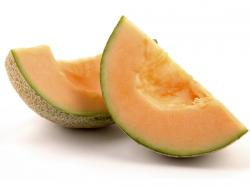California Cantaloupe Producers Launch Mandatory Food Safety Program
June 13, 2013 | 3 min to read

Dinuba, CA — As the summer cantaloupe season moves into full swing and consumers see larger melon displays at their local supermarkets, many will be pleased to learn about a new mandatory food safety program in place to ensure the safety of the majority of cantaloupes produced during the summer months.
“Beginning this year, California cantaloupe farmers and shippers of all sizes will be operating under the only mandatory food safety program that requires government audits of all cantaloupe production activities,” said Steve Patricio, a California melon producer and chairman of the California Cantaloupe Advisory Board (CCAB), which represents all cantaloupe producers in the state. “The CCAB food safety program invites government auditors to inspect all aspects of operations including growing, harvesting, packing and cooling to ensure a set of science-based standards is being followed.” California produces 75 percent of all cantaloupes sold in the United States.
The CCAB has been in existence since 1988 as a state marketing order under direction of the California Department of Food and Agriculture (CDFA). This past winter, cantaloupe handlers unanimously voted to add a mandatory food safety program to their marketing order. The group has elected to use United States Department of Agriculture trained CDFA auditors to verify that food safety practices are being following by all cantaloupe producers.
“CCAB is using government auditors instead of private inspection companies to ensure accountability, uniformity and consistency of audits throughout the California cantaloupe industry,” explained Patricio. “Under the program, handlers will be required to be in 100 percent compliance with food safety audits which includes 156 checkpoints.”
“Our agency is pleased to be able to respond to commodity groups such as cantaloupes and leafy greens who are asking the government for assistance,” said Karen Ross, Secretary of CDFA. “These programs make a lot of sense in today’s fiscally challenging times because they represent a public-private partnership in which government provides a truly independent, third-party inspection service with funding provided by industry rather than the taxpayers.”
Patricio also explained the CCAB’s mandatory government audit program will allow California cantaloupe producers to meet or exceed requirements found in the Food Safety Modernization Act when it is implemented. Produce buyers and consumers will eventually be able to identify California cantaloupes produced under the CCAB program through a certification seal.
Patricio noted the California cantaloupe producers have a history of innovating and adopting practices to improve safety and quality. The CCAB audits are based on 20 years of university research with input from government and food safety experts. The CCAB continues to support improvements in food safety and has committed funds to the Center for Produce Safety. The CCAB food safety standards can be easily updated as new science emerges.
The CCAB food safety audit checklist is available to the public and can be found at a new website also being launched this week at www.californiacantaloupes.com. The website posts the food safety guidelines used to develop the checklist and a list of all California cantaloupe handlers who are subject to mandatory government inspection. For consumers, the site also includes basic information about the food safety program, recipes and usage ideas and a host of information about selecting, storing and handling cantaloupe. Later in the summer, the CCAB will launch some innovative consumer promotions and contests designed to make consumers aware of the health, safety and quality of California cantaloupe.
“Harvest of California cantaloupe has already begun in the desert growing reasons of the state and producers here have been undergoing the government audits,” said Bill Colace of Five Crowns Marketing, a farmer, packer and shipper of fresh produce located in Brawley, CA. “From our standpoint the audit has been beneficial because it is making everyone focus even more than we already were on food safety and best practices. We have never had a foodborne illness outbreak associated with California cantaloupes and we want to do everything we can to ensure that we never do. These government audits require that we pay attention to detail in order to achieve the required 100 percent compliance with all checkpoints.”
For more information on the California Cantaloupe Advisory Board and California cantaloupe, please visit www.californiacantaloupes.com.
Source: California Cantaloupe Advisory Board
